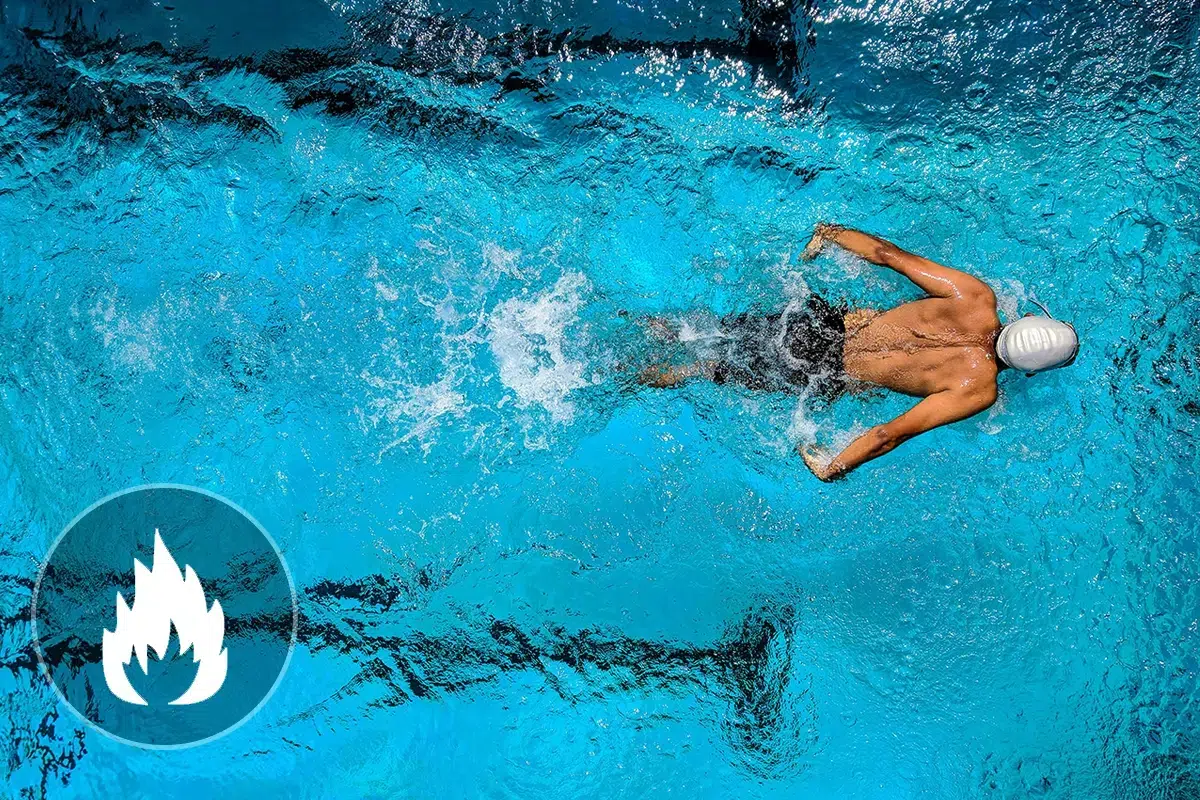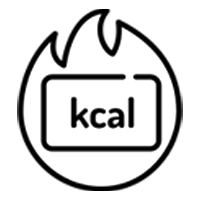Show summary Hide summary
How many calories do we burn swimming?

Everything you need to know about swimming
🏊♂️ Want to know how many calories you’re burning with 30 or 60 minutes of swimming? Just enter your profile and workout time – our tool will calculate your energy burn.
Swimming: A few examples of energy expenditure depending on weight and activity time.
Use the table below to see how many calories you can burn swimming freestyle!
Free swimming
moderate intensity
Expenditure in Kilocalories
| Weight | 15 minutes | 30 minutes | 1 hour |
|---|---|---|---|
| 40 kg | 84 | 168 | 336 |
| 50 kg | 105 | 210 | 420 |
| 60 kg | 126 | 252 | 504 |
| 70 kg | 147 | 294 | 588 |
| 80 kg | 168 | 336 | 672 |
| 90 kg | 189 | 378 | 756 |
Freestyle swimming
high intensity
Expenditure in Kilocalories
| Weight | 15 minutes | 30 minutes | 1 hour |
|---|---|---|---|
| 40 kg | 105 | 210 | 420 |
| 50 kg | 131 | 263 | 525 |
| 60 kg | 158 | 315 | 630 |
| 70 kg | 184 | 368 | 735 |
| 80 kg | 210 | 420 | 840 |
| 90 kg | 236 | 473 | 945 |
See detailed calculations and metabolic equivalent for swimming
Everything you need to know about swimming
FIND OUT MORE ABOUT SWIMMING
Swimming is an all-round sport that provides excellent energy expenditure and has the advantage of developing all the body’s muscles, not forgetting its ability to improve endurance.
What’s more, unlike other sports, swimming offers the great advantage of building muscle without putting too much strain on the joints. This sport is included in the best sports for weight loss.
Discover the other swimming strokes :
Whether you swim for pleasure, for training or for competition, swimming is a physical activity that involves every muscle in the body and improves overall fitness.
Some benefits of swimming:
- Muscle strengthening: Swimming involves every muscle in the body, from head to toe. It builds muscle strength, particularly in the arms, legs, shoulders, back and abdominal muscles. It also promotes muscle toning and definition.
- Improving cardiorespiratory endurance: Swimming is a sport that requires good respiratory and cardiovascular capacity. It strengthens the cardiorespiratory system, improves lung capacity and promotes better blood circulation. This contributes to a healthy heart and enhanced physical endurance.
- Working the whole body: Swimming involves all muscle groups in a balanced way, enabling harmonious muscle development. It also promotes flexibility, suppleness and range of motion.
- Low impact on joints: Swimming is a low-impact sport, as the water supports part of the body’s weight, reducing stress on the joints. It’s a recommended activity for people with joint or muscle problems, as well as those undergoing rehabilitation.
- Calorie burning: Swimming is an activity that burns a significant number of calories. Constant movement in the water and its natural resistance stimulate muscles and the metabolism, helping you to lose weight and maintain a healthy weight.
- Improved coordination and balance: Swimming requires precise coordination of the arms, legs and of breathing. This helps improve overall coordination, balance and proprioception.
- Mental stimulation: Swimming can also have mental benefits. It promotes relaxation, stress reduction and improved mood. What’s more, swimming can be a meditative activity that helps you refocus and relax mentally.
- Accessible to all ages: Swimming is an activity that can be enjoyed at any age, whether by children, adults or the elderly. It is also suitable for people of all fitness levels, as the intensity of effort can be adapted to suit individual abilities.
In conclusion, swimming in a pool is an all-round sport that offers numerous benefits for body and mind. Whether you’re looking to improve your physical condition, tone your muscles, lose weight, relieve joint pain or just have fun, swimming has a lot to offer.
How to calculate the number of calories burned swimming
The result displayed is expressed in Kcal and is calculated from the MET (Metabolic Equivalent of Task). The MET for each activity is the result of statistical data and cannot therefore be interpreted as an exact calculation, but rather as an estimate taking into account the MET value and the ratio between the time spent on an activity and the individual’s weight.
For example: the MET value for swimming is 6 for recreational, 8 for moderate and 10 for intense. This means that a moderate swimmer consumes 8 times more energy than he or she would at rest while swimming (freestyle).
MET values for different levels of swimming intensity
- Low-intensity swimming: MET = 6
- Moderate-intensity swimming: MET = 8
- High-intensity swimming: MET = 10
Discover the detailed formula to calculate your daily energy expenditure while swimming
Consumption in Kcal per minute = (METs*3.5*Weight in kilos)/200
This gives for a 70-kilo person swimming a moderate stroke for 30 minutes:
Consumption in Kcal per minute = (8*3.5*70)/200 = 9.8 Kcal/mn
So for 30 minutes = 9.8*30 = 294 kcal for 30 minutes
All sports in detail!



















































